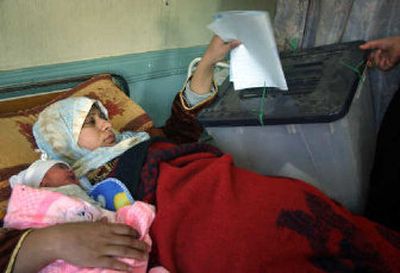As Iraqis start voting, militants denounce elections

BAGHDAD, Iraq – Armed with assault rifles, a group of men in black hoods walked through parts of the insurgent stronghold of Ramadi plastering walls with election posters.
The men claimed to be insurgents, then raised a large banner supporting a Sunni Arab candidate. Standing next to them was a man, wearing no mask and carrying no weapon, holding up a poster for other Sunni candidates.
“Elect them for the sake of defending the rights of the Iraqi population,” the first banner said. “They have pure hands,” said the second.
The disaffected Sunni Arab minority could be preparing to turn out in large numbers in Thursday’s general elections. Their participation offers hope that the elections could be less violent than last January’s, when the insurgency threatened to attack polling stations.
On Monday, Al-Qaida in Iraq and four other Islamic extremist groups denounced the parliamentary elections as a “satanic project” that violated God’s law, but they stopped short of an explicit threat to attack polling stations.
U.S. officials hope that Sunni Arabs will vote in large numbers, a development that could produce a government capable of winning the trust of the Sunnis and defusing the insurgency. That would enable U.S. and other foreign troops to begin heading home next year.
In a rare joint statement, the five militant groups denounced the election as a “satanic project” and said that “to engage in the so-called political process” violates “the legitimate policy approved by God.”
The groups vowed to “continue our jihad (holy war) … to establish an Islamic state ruled by the book (the Quran) and the traditions of the Prophet Muhammad.”
However, the statement contained no clear threat to disrupt voting as in the run-up to the Jan. 30 election and the Oct. 15 referendum on the constitution.
The authenticity of the statement could not be verified, but it appeared on a Web site that often publishes extremist material.
The absence of a clear-cut threat could reflect the growing interest among Sunni Arabs, the foundation of the insurgency, to take part in the election. The Sunni decision to boycott the January ballot left parliament in the hands of Shiites and Kurds – a move which increased communal friction and cost the Sunnis considerable influence in drafting the constitution.
A leaflet that appeared Monday in the Baghdad Sunni stronghold of Azamiyah acknowledged that Sunni Arabs could make gains in the election but that “fighting will continue with the infidels and their followers.”
The statement was unsigned but was written in a style favored by Islamic extremists.
Most Iraqis disapprove of the presence of U.S. forces in their country, yet they are optimistic about Iraq’s future and their own personal lives, according to a new poll.
More than two-thirds of those surveyed oppose the presence of troops from the United States and its coalition partners and less than half, 44 percent, say their country is better off now than it was before the war, according to an ABC News poll conducted with Time magazine and other media partners.
Three-quarters say they are confident about the parliamentary elections. More than two-thirds expect things in their country to get better in the coming months. However, only a third in the Sunni regions were optimistic about their country’s future.
In the first day of early voting, about 250,000 Iraqis – soldiers, police, hospital patients and prisoners in jail – cast ballots, according to election official Abdul-Hussein Hendawi. Iraqi television aired footage showing inmates in orange jumpsuits depositing their ballots in jailhouse boxes.
The U.S.-led multinational force said 90 percent of all eligible detainees held in facilities under its control participated in the vote. It did not release the number represented by that percentage. Suspected insurgents held in detention but not convicted were eligible to vote, officials said.
Deposed leader Saddam Hussein, who is jailed and facing trial for the deaths of more than 140 Shiites in 1982, could also vote, but it was not know if he did.
Abroad, an estimated 1.5 million expatriate Iraqis will begin voting today over a two-day period in polling centers in 15 countries including the United States.
Most of the 15 million registered voters go to the polls Thursday.
Sunni Arab politicians have promised an end to what they term abuse at the hands of the Shiite-dominated security services. As voting began, the Human Rights Ministry and the U.S. military said that 13 prisoners were hospitalized after being found at an overcrowded prison run by the Shiite-led Interior Ministry.
Later Monday, Al-Jazeera television aired a video allegedly showing abuse at another Interior Ministry facility in western Baghdad. The footage showed dozens of men, many with welts and bruises. The station did not say how it obtained the footage or when the alleged incidents took place.
President Bush said Iraqi prisoners held in secret detention centers apparently were beaten and tortured.
“This conduct is unacceptable,” Bush said in the Philadelphia speech. “Those who committed these crimes must be held to account.”
Prime Minister Ibrahim al-Jaafari, a Shiite, ordered an investigation into what he described as an “unhealthy phenomenon.” A similar case also surfaced last month.
“I will not allow such treatment of any prisoner,” al-Jaafari said during a news conference.
U.S. and Iraqi officials have expected an upsurge in insurgent violence as the election approaches.